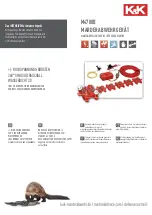
Rockwell Automation Publication 2100-IN012D-EN-P - September 2010
91
Maintenance
Chapter
9
14.
Check contactor and relay coils for evidence of overheating, such as
cracking, melting, or burning of insulation.
If there is evidence of overheating, the coil must be replaced. When
replacing a coil, check and correct the overvoltage or undervoltage
conditions that may have caused the coil failure. Be sure to clean any
residue of melted coil insulation from other parts of the device and replace
as necessary.
15.
Check all pilot lights and replace lamps and damaged lenses as necessary.
16.
Check all fuses.
If replacing fuses, install the same type and rated fuse that was originally
furnished with the MCC.
17.
Remove accumulated dust and dirt from structure and individual units by
vacuuming.
Do not use compressed air, as it may contain moisture and blow debris
within the enclosure.
18.
Refer to individual user policies, NFPA 70B, Recommended Practice for
Electrical Equipment Maintenance for MCC Servicing Guidelines.
Disconnect the Switch and
Contact Lubrication
If a switch that is used frequently becomes difficult to operate or is in a highly
corrosive or caustic environment, it may require lubrication. The lubricant to be
used is NO-OX-ID Compound (catalog number 2100H-N18 for a 1 pt can or
catalog number 2100H-N18T for a 1 oz tube). To obtain the lubricant, contact
your local Rockwell Automation Sales Office, distributor or Rockwell
Automation.
ATTENTION:
Follow NFPA 70E safety guidelines when working on energized equipment.
To prevent injury or death to personnel lubricating disconnect switch
contacts, make sure the MCC power source(s) is disconnected and the
respective disconnect(s) is locked in the OFF/O position. For plug-in units,
remove the unit from the MCC.
To prevent personal injury or damage to equipment, make sure that the unit
handle operator is in the OFF/O position before removing the unit.
















































